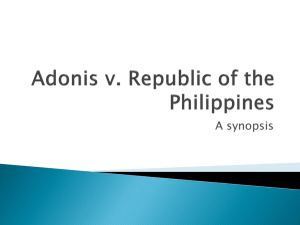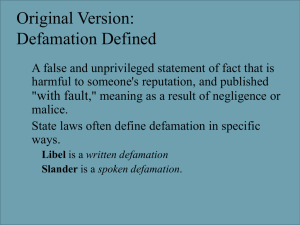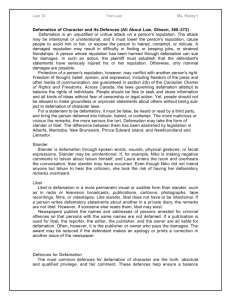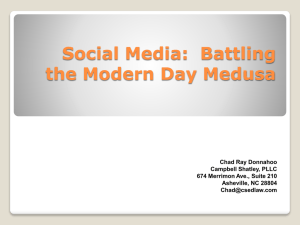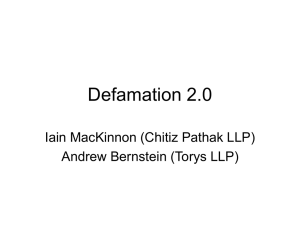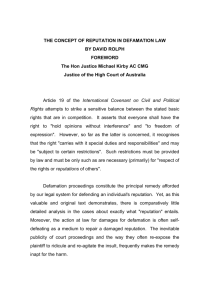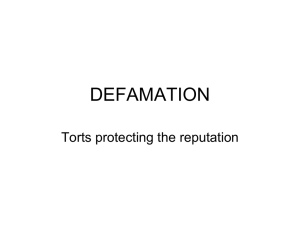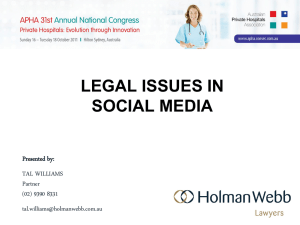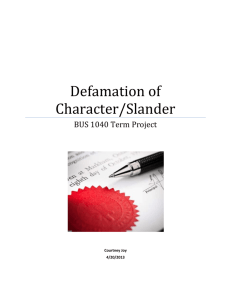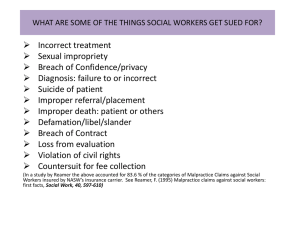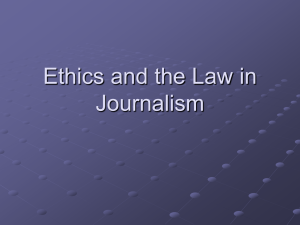Cyberbullying
advertisement
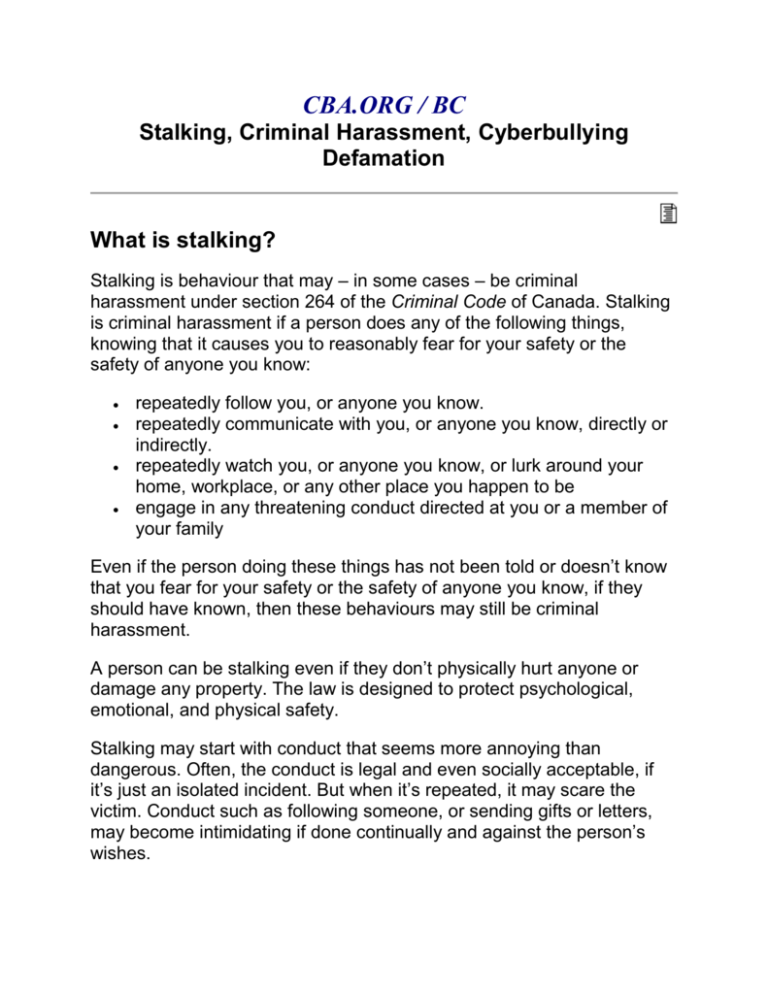
CBA.ORG / BC Stalking, Criminal Harassment, Cyberbullying Defamation What is stalking? Stalking is behaviour that may – in some cases – be criminal harassment under section 264 of the Criminal Code of Canada. Stalking is criminal harassment if a person does any of the following things, knowing that it causes you to reasonably fear for your safety or the safety of anyone you know: repeatedly follow you, or anyone you know. repeatedly communicate with you, or anyone you know, directly or indirectly. repeatedly watch you, or anyone you know, or lurk around your home, workplace, or any other place you happen to be engage in any threatening conduct directed at you or a member of your family Even if the person doing these things has not been told or doesn’t know that you fear for your safety or the safety of anyone you know, if they should have known, then these behaviours may still be criminal harassment. A person can be stalking even if they don’t physically hurt anyone or damage any property. The law is designed to protect psychological, emotional, and physical safety. Stalking may start with conduct that seems more annoying than dangerous. Often, the conduct is legal and even socially acceptable, if it’s just an isolated incident. But when it’s repeated, it may scare the victim. Conduct such as following someone, or sending gifts or letters, may become intimidating if done continually and against the person’s wishes. What is cyberbullying? Cyberbullying is a type of harassment using new technology. Whether it is criminal harassment depends on the facts of a case. Cyberbullies use social media (such as Facebook, Twitter, and YouTube), blogs, texting, instant messaging, and other internet avenues to engage in deliberate, repeated, and hostile behaviour intended to harm, embarrass, or slander someone. Although their work is public, cyberbullies are anonymous and it is often harder to identify and stop them. Cyberbullying may also be defamation. The Criminal Code (section 300) outlaws publishing a "defamatory libel" – material published, without lawful justification or excuse, likely to injure the reputation of any person by exposing them to hatred, contempt or ridicule, or designed to insult the person. But criminal defamation is rare. More common is civil defamation – communication about a person that tends to hurt their reputation. Defamation is outlined below. What can you do if someone is stalking, harassing, or cyberbullying you? 1. First, if the harassment is attempted communication with you, tell the person to stop. Otherwise, they may not know that they are harassing you. Otherwise, never reply to harassing messages. 2. Call the police to report the problem. Record the details of every incident, including time, date, place, who was involved, and what was said and done. Keep letters, notes, voicemail messages, emails, texts, instant messages, and social media and internet posts. Give them to the police. 3. If the harassment happens at school, report it to the school authorities, as well as to the police. If it happens at work, report it to your boss, plus the police. 4. Report cyberbullying or other harassing communication to your internet or cellphone company. Most companies have policies on acceptable use of their services, and can cancel the service of a customer who violates those policies. The company can also help police find a cyberbully who is using their network. 5. If you get a harassing phone call on a landline, dial *57 immediately when the call ends. The phone company will record the phone number that made the call, so the police can get it. If you receive harassing calls on your cell phone, call the phone company for help in tracking the calls. 6. You can also seek a civil restraining order in court. But to do this, you need legal advice. What happens after you report the problem? If a person is charged with criminal harassment, Crown Counsel (the prosecutor) makes the case against (or prosecutes) them. The prosecutor may proceed by indictment for serious cases, and then the maximum penalty is 10 years in jail. Or the prosecutor may proceed by summary conviction for less serious cases, and then the maximum penalty is either a fine or 6 months in jail, or both. If a court finds a person guilty, it will probably order the person to obey certain conditions. For example, a court will normally order a person convicted of criminal harassment to have no contact with you directly or indirectly, to stay away from your home and workplace, and to not own or carry any weapons. A court may also order a convicted person to take counseling, if it might help. If the court sends the person to jail and fines them, it cannot also order them to obey conditions. Usually, a court will order the person to obey conditions and either fine or jail them. What is defamation? Defamation is communication about a person that tends to hurt the person's reputation. Defamation is a strict liability tort, which means that the intentions of the defamer are not relevant. The communication must be made to other people, not just to the person it's about. The statement must be false to be classified as defamation. If it is spoken, then defamation is termed “slander". If it is written, it is termed “libel”. It can also be a gesture, which is a type of slander. The law protects your reputation against defamation. If someone defames you, you can sue them to pay money (called “damages”) for harming your reputation. You have to sue in Supreme Court, not Provincial Court, and you have to sue within 2 years of the defamation. It is not relevant the timing of when you discovered the defamation. Rather, the limitation period commences on the date the defamatory statement was made or published. The law doesn't protect you from a personal insult or a remark that injures only your pride; it protects reputation, not feelings. So if someone calls you a lazy slob, you might be hurt, but you probably don't have a good reason to sue. If he goes on to say you cheat in your business dealings, you probably do have a good reason to sue, as long as he says it to someone else, not just to you. If he says it only to you, you can't sue because he has not hurt your reputation. What is libel? Libel is the type of defamation with a permanent record, like a newspaper, a letter, a website posting, an email, a picture, or a radio or TV broadcast. If you can prove that someone libeled you, and that person does not have a good defence (see the section on defences below), then a court will presume that you suffered damages and award you money to pay for your damaged reputation. But going to Supreme Court is expensive and even if you win, you may not get as much as it costs you to sue. In deciding on damages, the Court will consider your position in the community. For example, if you are a professional, damages may be higher. What is slander? Slander is the type of defamation with no permanent record. Normally it's a spoken statement. It can also be a hand gesture or something similar. The law treats slander differently than libel: with slander, you have to prove you suffered damages, in the form of financial loss, to get compensation. But with libel, the law presumes you suffered damages. For example, say that Bill told John you were a cheat, and then John refused to do business with you because of that. You sue Bill and prove that you lost business with John because of what Bill said. Bill would have to pay you for the loss of John's business, but not for the general damage to your reputation. It can be very hard to prove this sort of financial loss. That's why most slander cases never go to court. But in the following four examples, a slander lawsuit may succeed without your proving financial loss. Even though there's no permanent record of the slander, the law will presume damages, as if it were libel, if someone: accuses you of a crime (unless they made the accusation to the police) accuses you of having a contagious disease makes negative remarks about you in your trade or business accuses you of adultery What about the right to free speech? The law protects a person's reputation but this protection can restrict other rights, such as the right to free speech. The law tries to balance these competing rights. Sometimes, even though someone made a defamatory statement that hurt a person's reputation, the law considers other rights more important. The law allows the following defences for a person who makes a defamatory statement. What are the defences to a defamation lawsuit? If someone sues for defamation, the most common defences are: truth (known in law as "justification") absolute privilege qualified privilege fair comment responsible communication on matters of public interest 1. Truth or justification A statement may hurt your reputation, but if it is true, anyone who says it has a valid defence if you sue them for defamation. 2. Absolute privilege There are two main examples of this defence: statements made in Parliament and statements made as evidence at a trial or in court documents. This privilege does not apply if a person repeats their evidence outside a courtroom. This defence also allows the fair and accurate reporting of these statements in the media, such as newspaper reports of a trial. People must be able to speak freely in our justice and political systems without worrying about being sued. 3. Qualified privilege This defence is where remarks that may otherwise be defined as defamatory were conveyed to a third party non-maliciously and for an honest and well-motivated reason. Say a former employee of yours gave your name to an employer as a reference and that employer calls you for a reference. You say, "Well, frankly, I found that this employee caused morale problems." As long as you act in good faith and without malice, and your statement is not made to more people than necessary, then the defence of qualified privilege protects you if the former employee sues you for defamation. You gave your honest opinion and the caller had a legitimate interest in hearing it. 4. Fair comment We all are free to comment – even harshly – about issues of public interest, as long as our comments are honest statements of opinion, based on fact, and not malicious. For example, a newspaper columnist may write that a Member of Parliament (an MP) says he supports equality and equal rights, but he opposes same-sex marriages. The columnist writes that the MP is hypocritical. If the MP sues the columnist for defamation, the columnist has the defence of fair comment. Media articles that accurately report what was said at public meetings are also privileged, unless the meeting was not of public concern and the report was not for public benefit. 5. Responsible communication on matters of public interest In a December 2009 case, the Supreme Court of Canada established this new defence to a libel claim. The court said that journalists should be able to report statements and allegations – even if they are not true – if there’s a public interest in distributing the information to a wide audience. This defense, which looks at the whole context of a situation, can apply if: the news was urgent, serious, and of public importance, and the journalist used reliable sources, and tried to get and report the other side of the story. The court defined “journalist” widely to include bloggers and anyone else “publishing material of public interest in any medium.” What effect does an apology have? A newspaper or a TV or radio station that publishes or broadcasts a libel can limit the amount of the damages they may have to pay by publishing or broadcasting an apology right away. Summary The law of defamation protects your reputation against false statements. If a person makes a false statement to someone and it hurts your reputation, you can sue the person who made the false statement for damages. But because of other competing rights in our society, such as free speech and fair comment, you will not always win. © Copyright 1983-2011 The Canadian Bar Association, British Columbia Branch
